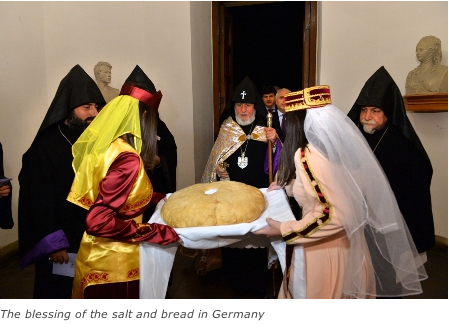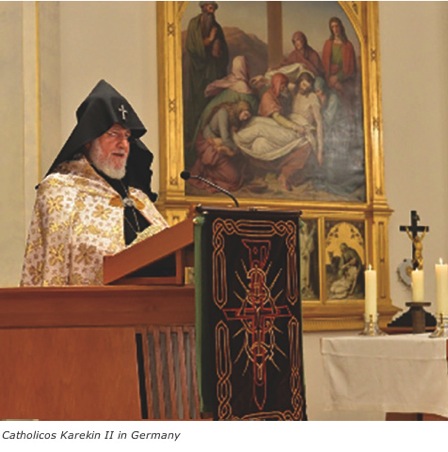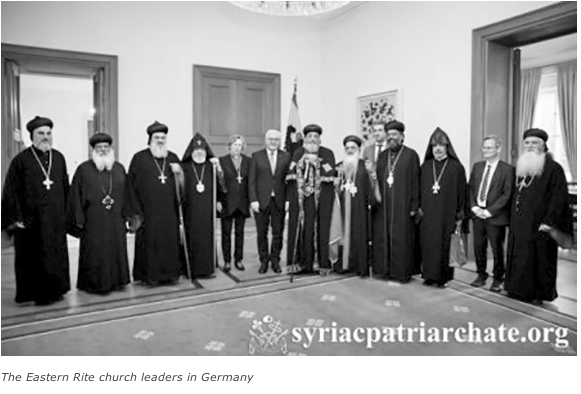Ecumenical Leaders Offer Prayers for Christians in Middle East
Oct/29/2017 Archived in:Culture


By Muriel Mirak-Weissbach
BERLIN, OCTOBER 26, 2017 — Among the hundreds of commemorative events organized to celebrate the 500th anniversary of the Reformation over the past year — “Luther year” in Germany — was a special gathering from October 18 to 21 in Berlin. On the invitation of the Evangelical Church in Germany (EKD), four of the highest representatives of the Eastern Orthodox churches met in the capital for a series of meetings and religious services dedicated to the situation of Christians in the Middle East today. Joining Catholicos Karekin II were the Syrian Orthodox Patriarch Ignatius Aphrem, Coptic Pope Tawadros and the Indian-Orthodox-Syrian Catholicos Baselios Marthoma for a five-day visit which included a meeting with the German president and participation in a conference organized by the EKD on the future of Christians in the Near East. The visit culminated in an ecumenical mass at the historic Berlin Cathedral, during which the leaders of the four churches joined with German Catholic and Protestant leaders to pray for Christians in the Middle East and for peace.
On October 18, the four visiting church leaders were received by German President Frank-Walter Steinmeier. The following day they met with representatives of the Bundestag (Parliament) factions and on October 20, they visited the Evangelical Center for Social Welfare and Development. Following the conference was the ecumenical church service.
In addition to the joint events, Catholicos Karekin II presided at a welcoming ceremony with the Armenian community at the Evangelical Luisenkirche on October 18, in a Hrashapar service, blessing all Armenians. On October 21, he laid a wreath at a Khatchkar (cross stone) which had been erected on the initiative of the German-Armenian Society (DAG) and ceremoniously dedicated on April 23, 2016, in memory of the victims of the Armenian Genocide. At the conclusion of his Berlin visit, Karekin II was at the St. Camillus Catholic Church to celebrate Divine Liturgy with Bishop Armash Nalbandyan, Primate of the Armenian Diocese of Damascus, and accompanied musically by the women’s choir of Geghard monastery. In addition to Nalbandyan, accompanying him on his visit were the Very Rev. Shahe Ananyan, dDirector of the Ecumenical Relations Department of Mother See, Rev. Ghevond Saghatelyan, dean of the Harichavank Turpanjian Theological High School, who served as staff bearer, Rev. Markos Mangasaryan, Director of the Social Services Department of Mother See and Ms. Tamara Shakaryan, member of the Legal Advisor Committee of Mother See.


The Fate of Christians in the Holy Land
At the center of the visit was the shared commitment to intervene in defense of the Christian community in the Middle East, whose very continued existence there is severely threatened. As discussed during the conference, Christians have been subjected increasingly to persecution, their sacred buildings, churches and monasteries, have been bombed to smithereens, and individual Christians have been driven out of their homes and murdered. In Egypt, the Copts have been victims of killings, their churches bombed even during mass. In Syria 85 churches have been destroyed, and about half of the Christians have left the devastated country. There is a very real danger that Christian culture and tradition will be eliminated in Syria. Therefore, the pleas on the part of the Orthodox religious leaders for churches in Germany, whom they thanked for helping so many refugees, to mobilize further to make it possible for Christians to remain in their lands of origin, and to live there in peace and security.
Regional Bishop Heinrich Bedford-Strohm, chairman of the EKD Council, expressed his gratitude for the participation of the visiting church leaders, noting that there are about 250,000 Christians belonging to these Orthodox communities who live in Germany. “Many of them,” he said, “have left their homeland in the Middle East, fleeing from war or civil war, from political or religious persecution, or from state repression.” Members of these communities in Germany have proven crucial in helping newly arrived refugees to integrate into society. They have also, it was said, contributed the fruits of their experience in inter-religious dialogue. The history of this dialogue, as was discussed in the conference, stretches back to the beginnings of the Protestant Reformation.
The Sermon on the Mount
The ecumenical service in the Berlin Cathedral, lasting well over two hours, was a profoundly moving ceremony which expressed the community of faith among the very distinct communities, a universality manifest in the articulation of prayer, each speaking in his own language, and in the harmony of music, sung by choirs of the four Eastern churches. The common message was that of Christ in his sermon on the mount. Catholicos Karekin II stressed how important it is to reflect, inspired by the Beatitudes, on the situation of Christians in the world today, “especially our Christian brothers and sisters in the Near East.” The words of Christ in this sermon, he said, are abiding and immortal for our modern world, in which “human suffering and sorrow, persecution and social catastrophes have become everyday occurrences.”
He said that the blessings, or Beatitudes, from the beginning have symbolized the similarity of Christ and Christians, in the pledge to take Christ as an example. They have come to identify Christians, and all churches, whether Eastern Orthodox or others, have “built the spiritual house of their faith in light of the message of the Beatitudes.” Through this message, Christians are to resemble Christ as meek in spirit, in seeking the riches of heaven; as those in mourning, having prayed for the renewal of the world and destruction of evil; as those thirsting and hungering for justice; as pure of heart, through mercy and brotherly love; and as peacemakers, even if persecuted for their faith.
Blessed, he said, are those who do not forget spiritual richness, those who do not forget the suffering and persecuted, who find God in every human being, who make peace in the world, who pray for the unity of Christians and religious tolerance in the world.
The message of this sermon, he said, has always remained the same, opening the path to love and likeness to God. “When today in the Near East religious intolerance and conflict have become integral parts of everyday life for innocent people there; when murder and persecution as a result of religious intolerance belong to the ideology of fundamentalists; when the destruction of religious cultural values thousands of years old, and the violent expulsion of people from places that are the cradle of Christianity are justified by a falsified and corrupted message of religion, then the Beatitudes give us once again reason — independent of religious affiliation and political tendency — to renew our readiness to proceed together along the path shown by our Lord Jesus Christ towards holiness and bliss.”
He concluded by asking all to pray together, to receive the invitation “that is addressed to us all, whether in the Near East, in Europe, in America or in the Far East.” All are invited to spread this message, “which is engraved not in tablets of stone but in spiritual tablets in our hearts and souls.”
(Material for this article has been drawn from press releases issued by the Evangelical Church in Germany (EKD), the Working Group of Christian Churches in Germany (ACK), and a German translation of the remarks by Catholicos Karekin II during the ecumenical service kindly made available by the German-Armenian Society (DAG). Translations into English are by the author.)

